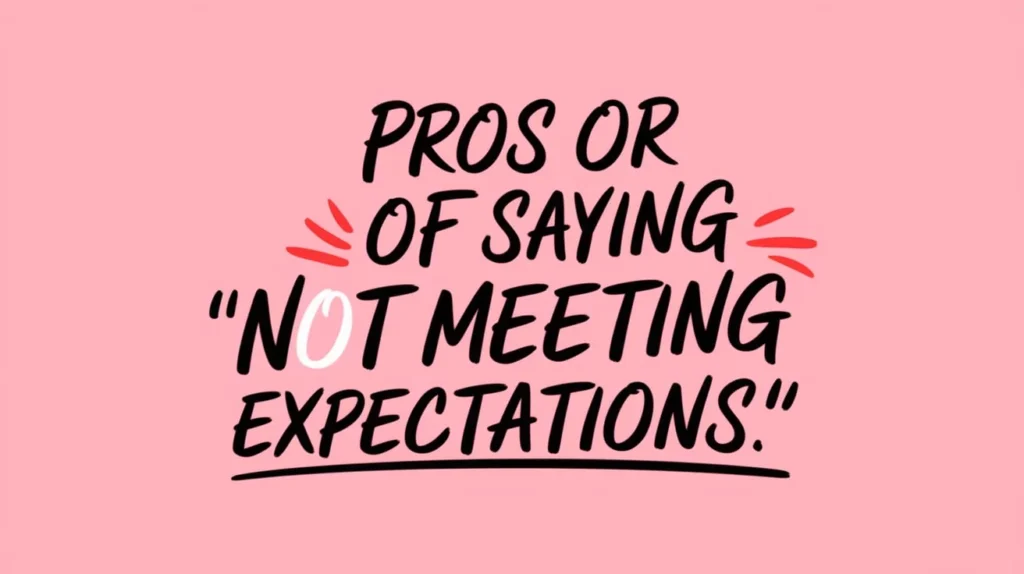Sometimes, giving feedback, especially when it’s not entirely positive, can be tricky. But choosing the right words can make all the difference in how your message is received. Saying someone isn’t meeting expectations doesn’t have to sound harsh or critical. In fact, with a bit of care and attention, you can convey the same message in a way that feels thoughtful, respectful, and encouraging.
This article will walk you through 20 other ways to say “not meeting expectations” this sentiment, along with some examples to make sure you can use them confidently in your emails and conversations. Let’s dive in and find the right words that help you communicate with care!
What Does “Not Meeting Expectations” Mean?
Before we jump into alternatives, let’s first understand what “not meeting expectations” really means. It’s the polite way of saying someone’s performance isn’t quite up to par, whether that’s in work, a project, or even social situations. Expectations are the standards we set for ourselves or others. When those aren’t met, we usually need to point it out—but how we do that matters. So let’s explore how to say the same thing with more empathy and understanding!
Is It Professional/Polite to Say “Not Meeting Expectations”?
You might wonder if it’s okay to use the phrase “not meeting expectations” in a professional setting. Well, the answer is—it depends! While it’s often necessary to address this in a constructive way, how you say it matters more than the words themselves. Direct phrases can come across as blunt, which may leave people feeling discouraged. That’s why it’s best to approach this topic with care, using alternatives that soften the tone while still conveying the message clearly.
Pros or Cons of Saying “Not Meeting Expectations”

Pros:
- Helps identify areas for improvement.
- Provides a clear, direct message.
- Can lead to growth and development if framed correctly.
Cons:
- Can sound critical or demoralizing if not phrased carefully.
- May be hard to accept without proper context or support.
- Might feel like a “final judgment” instead of a growth opportunity.
Synonyms for
- Falling Short of Expectations
- Not Quite Hitting the Mark
- Below Par
- Not Up to Standard
- Not Living Up to Expectations
- Not Quite There
- Lacking in Some Areas
- Not Achieving the Desired Outcome
- Underperforming
- Not Meeting the Target
- Not Delivering as Expected
- Not Quite Reaching Expectations
- Not Meeting the Benchmark
- Not Quite Measuring Up
- Underperforming in Key Areas
- Not Meeting the Criteria
- Missing the Mark
- Not Up to Our Usual Standards
- Not Meeting Our Expectations
- Below the Expected Standard
1. “Falling Short of Expectations”
This phrase softens the blow while still addressing the issue. Instead of saying someone didn’t meet expectations, you’re acknowledging that they tried, but things didn’t quite add up.
Scenario Example:
Hi [Name],
I’ve reviewed the project you’ve worked on, and it seems there are a few areas where the results are falling short of expectations. Let’s set up a time to discuss how we can get things back on track.
Best regards,
[Your Name]
Best Use: When you want to acknowledge effort but still need to point out areas for improvement.
Additional Notes: This is a softer approach and works well when you want to maintain a supportive tone.
2. “Not Quite Hitting the Mark”
A more casual way to say that something didn’t meet expectations. It gives the sense that the target was close, but not quite reached.
Scenario Example:
Hey [Name],
I took a look at your recent submission, and while there’s a lot of great work, it’s not quite hitting the mark in a few areas. Can we revisit some details to make sure we’re aligned?
Best,
[Your Name]
Best Use: When you want to keep things light yet constructive.
Additional Notes: This phrase is helpful in a team-oriented, positive environment.
3. “Below Par”
“Below par” is a friendly and non-judgmental way to suggest that someone’s work didn’t quite meet the standard. It’s commonly used in casual settings and helps keep things low-pressure.
Scenario Example:
Hi [Name],
I’ve reviewed the deliverables, and it appears they’re below par in terms of what we discussed. I’m confident we can improve this together—let’s chat soon.
Cheers,
[Your Name]
Best Use: When you want to acknowledge that something isn’t up to scratch but keep the mood positive.
Additional Notes: It works well in informal settings or when you’re on good terms with the person.
4. “Not Up to Standard”
This phrase is very neutral, making it perfect for professional environments where you need to keep the tone polite yet clear.
Scenario Example:
Hello [Name],
I appreciate the work you’ve done so far, but it seems that the results are not up to standard for what we were expecting. Let’s connect to see how we can address this.
Best regards,
[Your Name]
Best Use: In formal settings or with colleagues you want to remain respectful toward.
Additional Notes: It’s straightforward but doesn’t carry any negative emotion.
5. “Not Living Up to Expectations”
This is a common, soft way of saying that someone hasn’t reached the level of performance expected. It’s a little more empathetic.
Scenario Example:
Hi [Name],
I’ve gone through the feedback, and it seems the work is not living up to expectations at the moment. Let’s work together to ensure we’re meeting the necessary criteria.
Warm regards,
[Your Name]
Best Use: When you want to address a gap but also convey a sense of collaboration.
Additional Notes: It implies that the person is capable of improvement and suggests partnership in fixing things.
6. “Not Quite There”
This is a nice, informal way to let someone know they haven’t fully achieved the goal but are very close. It’s motivational and positive.
Scenario Example:
Hi [Name],
I reviewed the latest draft, and it’s not quite there yet. A few more tweaks and you’ll be all set. Let me know if you need any help with that!
Best,
[Your Name]
Best Use: In casual or supportive work environments where you want to show optimism.
Additional Notes: Encouraging and leaves room for improvement without any harshness.
7. “Lacking in Some Areas”
A very neutral, almost clinical way to point out that something isn’t meeting the goal. It’s a bit more formal but still empathetic.
Scenario Example:
Dear [Name],
Thank you for submitting the report. However, it seems to be lacking in some areas that we discussed. Can we go over those to make sure we’re on the same page?
Best regards,
[Your Name]
Best Use: In more formal environments where direct feedback is necessary.
Additional Notes: Works well for highlighting specific weaknesses without sounding too harsh.
8. “Not Achieving the Desired Outcome”
This phrase is more objective and helps focus on the result rather than the effort or intention. It’s less personal and can feel less critical.
Scenario Example:
Hello [Name],
I’ve reviewed the work, and it seems we’re not achieving the desired outcome at this stage. Let’s connect soon to discuss next steps and improvements.
Best regards,
[Your Name]
Best Use: When you want to keep feedback professional and focused on the results.
Additional Notes: Helps to avoid making it feel personal, focusing purely on the task.
9. “Underperforming”
A direct yet somewhat softer term to describe when something is under the expected level of performance. It can work in both professional and casual settings, depending on your tone.
Scenario Example:
Hi [Name],
I noticed that the project seems to be underperforming compared to our usual standards. Let’s discuss how we can get things back on track.
Cheers,
[Your Name]
Best Use: When you need to address performance directly but want to keep things constructive.
Additional Notes: It’s straightforward but not harsh, and allows space for improvement.
10. “Not Meeting the Target”
This alternative works well when referring to measurable goals or objectives. It focuses on the specific target that was missed.
Scenario Example:
Hi [Name],
It looks like we’re not meeting the target that was set for the campaign. Can we discuss how to adjust our approach going forward?
Best,
[Your Name]
Best Use: When you’re working with clear, measurable goals or KPIs.
Additional Notes: This phrase is great for when the expectations are tied to specific, quantifiable results.
11. “Not Delivering as Expected”
This phrase focuses on the idea that the results aren’t what were anticipated or required, which can apply to many situations—whether it’s a product, performance, or effort. It’s direct but still maintains a certain level of professionalism.
Scenario Example:
Hi [Name],
I’ve reviewed your work, and unfortunately, it’s not delivering as expected. Let’s set up a meeting to discuss how we can get things back on track and align on the goals.
Best regards,
[Your Name]
Best Use: When addressing a performance issue that’s not meeting a specific requirement.
Additional Notes: This phrase works well in professional settings where clarity is important but you still want to keep the tone respectful.
12. “Not Quite Reaching Expectations”
Slightly softer than other alternatives, this expression implies that someone came close, but there’s still a gap. It’s motivating and non-judgmental, leaving room for improvement.
Scenario Example:
Hey [Name],
I reviewed the presentation, and while it’s really good, it’s not quite reaching expectations. I think with a few more tweaks, it’ll be perfect.
Best,
[Your Name]
Best Use: In a situation where the person has made some progress but still needs a little more work.
Additional Notes: This phrase is more encouraging and leaves room for optimism and growth.
13. “Not Meeting the Benchmark”
A bit more formal, this phrase refers to a specific standard or measure that was set. It’s useful when you want to point out that the output hasn’t quite reached a pre-established level.
Scenario Example:
Hi [Name],
It looks like the recent report is not meeting the benchmark we had set for this project. Let’s schedule some time to review the expectations and make adjustments as needed.
Best regards,
[Your Name]
Best Use: When you’ve established clear benchmarks or standards for comparison.
Additional Notes: This can work well in performance evaluations or projects where there are set metrics.
14. “Not Quite Measuring Up”
This phrase gives the sense that something has fallen a little short, but not drastically so. It conveys that while things aren’t quite right, it’s not a major failure.
Scenario Example:
Hi [Name],
After reviewing your recent work, it’s not quite measuring up to what we had hoped for. I’d like to go over some specifics with you to see how we can improve it.
Best,
[Your Name]
Best Use: When the results are just below the expected level but still in the range of being fixable.
Additional Notes: This phrase keeps things light, helping to avoid sounding too critical.
15. “Underperforming in Key Areas”
A more specific way of highlighting where the performance gap is occurring. By calling out “key areas,” you’re emphasizing where improvements are needed, rather than saying it’s a general issue.
Scenario Example:
Hello [Name],
I noticed that the project is underperforming in key areas, especially with the timeline and deliverables. Let’s collaborate on ways we can improve the results moving forward.
Best,
[Your Name]
Best Use: When there are specific areas of performance that need attention.
Additional Notes: This is useful when you want to focus on actionable improvements without criticizing the person as a whole.
16. “Not Meeting the Criteria”
This is a very straightforward way to say something doesn’t fit the established requirements or expectations. It’s clear and to the point, without being overly harsh.
Scenario Example:
Hi [Name],
I’ve reviewed your recent work, and unfortunately, it’s not meeting the criteria we set for this project. Could we revisit the goals and discuss adjustments?
Best,
[Your Name]
Best Use: When there are clear and measurable criteria to meet.
Additional Notes: This works well when you need to keep things professional and focused on standards.
17. “Missing the Mark”
A simple and effective alternative that conveys that the goal wasn’t quite achieved. It’s a neutral way of suggesting that something fell short without making it feel like a failure.
Scenario Example:
Hi [Name],
I’ve had a look at the results, and it seems we’re missing the mark on a few key points. Let’s chat to see where we can adjust the strategy.
Best regards,
[Your Name]
Best Use: When you want to keep things casual while pointing out areas for improvement.
Additional Notes: This phrase is often used in more relaxed or informal settings.
18. “Not Up to Our Usual Standards”
This is a great way to say that the performance is lower than expected without implying it’s a complete failure. It also references a higher bar, reminding the person of the usual level of work.
Scenario Example:
Hi [Name],
Thank you for the effort you put into this, but it’s not up to our usual standards. Let’s go over it together and figure out where we can make improvements.
Best,
[Your Name]
Best Use: When you want to maintain a positive tone while acknowledging a dip in quality.
Additional Notes: This can work well in a team environment, where you’re encouraging everyone to rise to their usual standards.
19. “Not Meeting Our Expectations”
A simple, straightforward alternative that is easy to understand and gets right to the point. It’s professional, polite, and clearly conveys the message.
Scenario Example:
Hello [Name],
After reviewing your recent work, it seems you’re not meeting our expectations in this area. I’d appreciate it if we could discuss how we can improve the outcome.
Best regards,
[Your Name]
Best Use: When you need to keep the message professional and direct without being overly critical.
Additional Notes: This phrase can be used in many contexts, especially in work-related discussions.
20. “Below the Expected Standard”
This alternative offers a more formal approach, stating clearly that something doesn’t meet the agreed-upon level of performance. It works well when you want to address the issue directly without sounding too critical.
Scenario Example:
Hi [Name],
It seems that the recent work you’ve submitted is below the expected standard. Let’s discuss what we can do to get things back on track.
Best regards,
[Your Name]
Best Use: When addressing formal performance expectations or standards.
Additional Notes: A great option for formal or performance-related feedback.
Conclusion
No matter how carefully we try, there will be times when things don’t meet expectations. However, the way we communicate this matters. Using these alternative phrases can help ensure that the message comes across constructively, with empathy and respect.
Instead of simply saying “not meeting expectations,” you can use these options to soften the blow, focus on improvement, and maintain strong relationships with those you work with.















